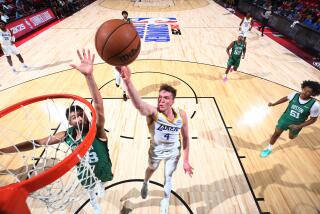Sampras Is Again King of the Court
Jack Kramer presented Pete Sampras with a weighty memento Saturday, a trophy for being ranked No. 1 in the world during 271 weeks, more than any man in tennis history. Ivan Lendl had held the record, 270 weeks, and since Lendl had mostly bored America, there has been no great outpouring of excitement over Sampras’ chase to break it.
This was not Mark McGwire and Sammy Sosa pursuing Roger Maris. There was a note on a media information sheet. If Sampras gets to the final he’s No. 1. He breaks the record.
But please, let’s stop and say thank you to Sampras for just a moment. For this record will most likely not be broken. To break it you must be blessed with fabulous physical gifts. But more than that you need something in your heart and in your head that allows you to accept pressure as the gift of fun, which compels you to chase history instead of paydays.
Sampras received respectful but unemotional applause from a stadium-court crowd at UCLA after the presentation. Sampras had just beaten a qualifier of no particular distinction named James Sekulov in 55 minutes, 6-0, 6-2, in the semifinals of the Mercedes-Benz Cup and this win guaranteed that Monday Sampras will be ranked No. 1.
Again.
But much of the crowd already had bolted. The sun was hot, the thirst was great, the smell of burgers grilling too enticing.
Sampras played superb tennis in those 55 minutes. There were volleys of such cruel, uncommon angles they caused Sekulov to sigh loud enough for us to hear. There was one of Sampras’ special slam-dunk overhead smashes. And once, he reached the backstop on the full run and climbed up, up, up, nearly into the stands chasing after a Sekulov lob. Sampras had no chance to reach the ball. He was funning with us. But try that some time. Try scampering up a 10-foot wall on the run with your tennis racket raised high in the air. It is a rare athlete who can do that.
This rare athlete first became ranked No. 1 on April 12, 1993, and that date is not accidental.
The athletic ability, the smooth quickness and explosive power, that was a gift, from good genes, from God, from however you want to believe we humans receive our physical pluses and minuses.
But the historic greatness, the domination of a game for a decade, the records and Grand Slam titles and now the 271 weeks of being ranked No. 1 in the world, that comes from the heart of Pete Sampras, and, of all things, it came for the first time after a defeat.
In 1992 Sampras lost in the final of the U.S. Open to Stefan Edberg, 3-6, 6-4, 7-6, 6-2. For the first time in his pro career, Sampras felt awful. He was angry, furious, absolutely sick to his stomach. It was a loss, Sampras said Saturday, “that changed my career. It was mentally as good a lesson as I’ve ever had.” What Sampras discovered on that muggy Sunday in New York was that he would never again be content to be only a finalist. He could not be happy as a wealthy top-10 player. His talents were special, he knew that, and now so was his head.
By the following April, Sampras was No. 1. That is where he has stayed for most of the last six years. By discovering how much he hated losing, Sampras became a great winner.
The difference between Sampras and Andre Agassi, who has been Sampras’ foil, in both style and substance, for these last six years has seemed to be that Agassi loved the winning, loved the moment of bright lights and loud applause. But the absolute greatest hate to lose more than they love to win. It is the avoidance of losing that is the driving force.
In two weeks Sampras will turn 28. He is not old, but tennis careers don’t extend too deeply into the 30s for most players. There will not be another 271 weeks of No. 1 rankings and this newest record did prompt Sampras to say, “It’s more of a career achievement. It’s being able to stay on top of the game, not months at a time but years at a time. There’s a certain pressure that comes with that. Some players handle it better than others. This is probably an achievement I’ll appreciate much more when I’m done playing.”
It is an achievement we should all appreciate now. It is ever so much more fun sometimes to root for Agassi, who defeated Andrew Ilie, 6-4, 6-2, in Saturday’s other semifinal. Agassi lets us into his soul. Agassi will laugh and cry for us and talk to us during a match.
But there is a breathtaking beauty to Sampras’ game. Listen to the sound of the ball when Sampras’ racket cracks a forehand and then listen again to how silently the balls will sneak off his racket on a volley.
And there is a poignancy to Sampras’ career. This winner of 12 Grand Slam titles, more than any man but Roy Emerson, says that even now he is propelled by the need to prove himself. “For me,” Sampras says, “for years of being a junior and always being considered a kid with great talent and not much heart and not much mind, I’ve kind of lived with that for many, many years. I guess I’m still trying to prove how far I can take my game.”
After Sampras won the 1990 U.S. Open as a shy, skinny 19-year-old, he made a clumsy statement in 1991 after losing in the quarterfinals to Jim Courier. “Maybe things will calm down,” Sampras said. “I’m not the reigning U.S. Open champion any more. And, you know, it’s kind of like the monkey is off my back a little bit.” For that Sampras was hammered, called a quitter, a baby and worse by people like Jimmy Connors. Even now Sampras remembers. Even now, he asks us to let him prove himself.
For 271 weeks the proof has been obvious. No one is better.
*
Diane Pucin can be reached at her e-mail address: diane.pucin@latimes.com.
More to Read
Go beyond the scoreboard
Get the latest on L.A.'s teams in the daily Sports Report newsletter.
You may occasionally receive promotional content from the Los Angeles Times.






